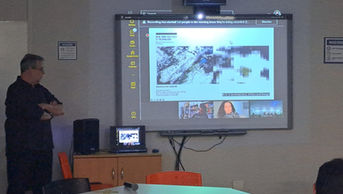top of page
[ RIO DE JANEIRO EXTENSION ]

Territorial development strategies and socio-economic of degraded urban areas in the hinterland of the Port of Rio de Janeiro – RJ / Brazil
Presentation:
The objective is the development of a multidisciplinary project that is guided by the possible transformations to be carried out in the catchment areas of Hinterlândia1 of the city of Rio de Janeiro, with infrastructure as drivers for the recovery of degraded urban areas that arise from the failures in the occupation and production of this territory.
The extension seeks to bring together researchers from partner universities that currently make up a network active in the theme related to the city-port, both in public management, in the development of urban improvement and its population occupation and in the approach to the relations of development of strategic plans, such as the private entities, their territorial organizations, functioning and effects on the use of physical space and infrastructure demand.
The project focuses on the Hinterlândia area, in partnership with the Municipality of Rio de Janeiro, port agents in shaping and discussing the improvement between city and water relations, providing solutions, both in the development of diagnoses and treatment of problems. and improving the quality of life of the local population and preparing matrices and studies on integrated regional development, based on local renewable resources and sustainable practices.
Thus, the following initial contributions to the structuring of the work can be considered: 1. Expansion of territorial analysis models, having the Method in Design Strategies (MEP)2 applied as support for the port area of Rio de Janeiro; 2. Identification of transformation processes taking place in port areas that make it possible to direct the recovery of the territory, the generation of jobs and new sociocultural relations; 3. Multidisciplinary exchange between the different areas of knowledge and institutions that allow the expansion of the debate on the applicability of strategies as an inducer of the Sustainable Development Goals (SDGs), providing the application of strategic planning for new urbanization processes.
As for the social impacts, it is essential that the following are highlighted: 1. New mechanisms of economic production and restructuring in the development of recovery plans for degraded areas; 2. Formulation of new scenarios for urban development and assistance to local communities at risk; 3. Expansion and recommendation for the development of possible public policies for the generation and recovery of degraded areas identified as:
The. shipyard sectors; B. vessel cemetery; ç. informal occupation; 4. Strengthening of new sectors of socioeconomic production, generating new geographic networks and urban development zones, as an attractive element for an adequate occupation between city zones and the sea.
1 GÕES, Hildebrando de A. Port planning. Rio de Janeiro: School of Engineering, Federal University of Rio de Janeiro, 2002. This term characterizes the territorial potential for cargo generation that is implemented by the level of development of the region in which the port is located, taking into account the transport infrastructure , costs and food service.
2 Methodological process structured from the dissection of the territory, being understood through its indicators and quantitative and qualitative surveys, this stage gives rise to the development of tactical actions through conceptual tools, which originates from the doctorate defended in 2012 - Design Strategies in Port Territory of Santos. HERNÁNDEZ ARRIAGADA,
Carlos Andrés. Design strategies in the territory of the port of Santos. 2012. 279 f. Thesis (Doctorate) – Faculty of Architecture and Urbanism – Universidade Presbiteriana Mackenzie, São Paulo.
[ TEAM ]
PROFESSORS

Carlos A. Hernández A.
FAU MACKENZIE - São Paulo

Paulo Roberto Correia
FAU MACKENZIE - São Paulo

Glaucia Garcia dos Santos
FAU USP - São Paulo

Tatiana Cortesi Tucunduva
FAU USP - São Paulo

Débora Sotto
FAU USP - São Paulo

Carlos Murdoch
UVA - Rio de Janeiro


Luis Rogério Pupo Gonçalves
UNISOCIESC - Santa Catarina
Claudia Lima Garcia
FAUG - Chile

Alberto Texido Zlatar
Universidad de Chile
George Beyer

Diretor do Centro de Investigação

Marcella Del Signore
NYIT - Nova Iorque

Cinthia Ruiz López
UNAM - México

Luzorquídea Castro Sánchez
UNAM - México
CONTRIBUTORS

Paula Toledo
FAU USP - São Paulo

Débora Lecce Rios
UNIRIO- Rio de Janeiro

Catalina García Arteaga
FAUG - Chile

Nicolás F. Parra-Urbina
FAUG - Chile
STUDENTS

Raquel Ferraz Zamboni
FAU MACKENZIE - São Paulo

Mariana Chaves Moura
FAU MACKENZIE - São Paulo

Eduardo Alejandro Riffo Durán
FAUG - Chile

Guilherme Gallo Cavenaghi
FAU MACKENZIE - São Paulo

Mariana Ragazzi Mendes
FAU MACKENZIE - São Paulo

Paola Serafim Filócomo
FAU MACKENZIE - São Paulo

Bruna Leticia de Fraga
FAU MACKENZIE - São Paulo

Isabella Basile Sposito
FAU MACKENZIE - São Paulo

Fábio Cabral dos Santos
UVA - Rio de Janeiro
[ DEVELOPMENT ]
Articles developed as part of the extension for the events SIIU - Seminario Internacional de Investigación en Urbanismo and 10th FAU Research Forum - Mackenzie.
TERRITORIAL SCENARIOS FOR THE PORT AREA OF RIO DE JANEIRO: Economic-urban development strategies for shipyard areas
ENDEMIC CONTAINMENT STRATEGIES: NAVAL POLLUTION AND HEALTH IN GUANABARA BAY - RJ
DEVELOPED ARTICLES
GUANABARA'S BAY-
CRISIS AND OPPORTUNITY
Lecture held in the auditorium of UVA- Universidade Veiga de Almeida, Tijuca Campus on September 29, 2022. Where the speakers spoke and taught students and interested parties about Guanabara Bay.
IV FÓRUM


WORKSHOP ON DESIGN STRATEGIES OF DEGRADED PORT ZONES IN GUANABARA BAY
The workshop will take place between January 7th and 13th at Veiga Filho University in Rio de Janeiro as part of the Extension "Strategies for territorial and socio-economic development of degraded urban areas of the hinterland of the Port of Rio de Janeiro – RJ / Brazil"
Acess the schedule
3rd INTERNATIONAL CONGRESS ON CITIZENSHIP, PUBLIC SPACE AND TERRITORY
"The 3rd International Congress on Citizenship, Public Space and Territory takes place from 3 to 5 November 2021 in Brazil, in the city of Pelotas. The event is promoted by Behavioral Studies Laboratory of the Federal University of Pelotas (UFPel). Together with the Laboratory, the Faculty of Architecture and Urbanism from UFPel hosts the event, online due to the pandemic, with the support of the Project PlaceAge , Graduate Program in Architecture and Urbanism of UFPel and University of La Gran Colombia . The Symposium is also developed with the support of LabCom Hospitalar and the Center for Healthy Cities, Ageing and Citizenship , which is part of UFPel's Institutional Internationalization Program – CAPES PRINT. This is a worldwide event that takes place annually in different countries; the latter was based in Bogotá and promoted by the Universidad La Gran Colombia."
For the congress, the Extension team developed the following board that was presented as a poster at the event
EGAL 2021 - XVIII ENCUENTRO DE GEOGRAFÍAS DE AMERICA LATINA
The XVIII “Meeting of Latin American Geographies” (EGAL) held in conjunction with the VIII National Congress of Geography of Public Universities of the Argentine Republic will take place in the city of Córdoba-Argentina, on November 30, 1, 2, 3 and 4 of 2021.
Aiming to strengthen the production of geographic knowledge as a contribution to the construction of a fairer, equitable, inclusive and solidary society, in the full exercise of democracy, we meet under the motto “Building emancipatory knowledge of and for territories”.











bottom of page






























































.png)








